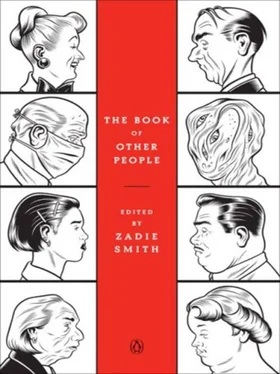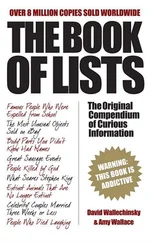‘Sure.’
‘Anyway, the point is, he sort of used up a lot of people’s patience with a certain kind of… paranoid stuff. I didn’t really get it until I started working with him. I mean, I like Perkus a lot. I just don’t want you to feel I wasted your time, or got you enmeshed in any… schemes.’
People could be absurdly protective, as if a retired actor’s hours were so precious. This was, of course, a second-hand affect, a leakage from Janice’s other-worldly agendas. I was famously in love with a woman who had no time to spare, not even a breath, for she dwelled in a place beyond time or the reach of anyone’s Rolodex, her every breath measured out of pressurized tanks. If an astronaut made room for me on her schedule, my own prerogatives must be as crucial as an astronaut’s. The opposite was true.
‘Thank you,’ I said. ‘I’ll be sure not to get enmeshed.’
Perkus Tooth was my neighbor, it turned out. His apartment was six blocks from mine, on East 84th Street, in one of those anonymous warrens tucked behind innocuous storefronts, buildings without lobbies, let alone doormen. The shop downstairs, Brandy’s Piano Bar, was a corny-looking nightspot I could have passed a thousand times without once noticing. BRANDY’S CUSTOMERS, PLEASE RESPECT OUR NEIGHBORS! pleaded a small sign at the doorway, suggesting a whole tale of complaint calls to the police about noise and fumes. To live in Manhattan is to be persistently amazed at the worlds squirreled inside one another, like those lines of television cable and fresh water and steam heat and outgoing sewage and telephone wire and whatever else which cohabit in the same intestinal holes that pavement-demolishing workmen periodically wrench open to the daylight and to our passing, disturbed glances. We only pretend to live on something as orderly as a grid. Waiting for Perkus Tooth’s door’s buzzer to sound and finding my way upstairs, I felt my interior map expand to allow for the reality of this place, the corridor floor’s lumpy checkerboard mosaic, the cloying citrus of some superintendent’s disinfectant oil, the bank of dented brass mailboxes and the keening of a dog from behind an upstairs door, alerted to the buzzer and my scuffling boot heels. I have trouble believing anything exists until I know it bodily.
Perkus Tooth widened his door just enough for me to slip inside, directly into his kitchen. Perkus, though barefoot, wore another antique-looking suit, green corduroy this time, the only formal thing my entry revealed. The place was a bohemian grotto, the kitchen a kitchen only in the sense of having a sink and stove built in, and a sticker-laden refrigerator wedged into an alcove beside the bathroom door. Books filled the open cabinet spaces above the sink. The countertop was occupied by a CD player and hundreds of disks, in and out of jewel cases, many hand-labeled with a permanent marker. A hot-water pipe whined. Beyond, the other rooms of the apartment were dim at midday, the windows draped. They likely only looked onto ventilation shafts or a paved alley anyway.
And then there were the broadsides Susan Eldred had described. Unframed, thumb-tacked to every wall bare of bookshelves, in the kitchen and in the darkened rooms, were Perkus Tooth’s famous posters, their paper yellowing, the lettering veering from a stylish cartoonist’s or grafittist’s hand-made font to the obsessive scrawl of an outsider artist, or a schizophrenic patient’s pages reproduced in his doctor’s monograph. I recognized them. Remembered them. They’d been ubiquitous downtown a decade before, on construction-site boards, over subway advertisements, another element in the graphic cacophony of the city one gleans helplessly at the edges of vision.
Perkus retreated to give me clearance to shut the door. Stranded in the room’s center in his suit and bare feet, palms defensively wide as if expecting something unsavory to be tossed his way, Perkus reminded me of an Edvard Munch painting I’d once seen, a self-portrait showing the painter wide-eyed and whiskered, shrunken within his clothes. Which is to say, again, that Perkus Tooth seemed older than his age. (I’d never once see Perkus without some part of a suit, even if it was only the pants, topped with a filthy white t-shirt. He never wore jeans.)
‘I’ll get you the videotape,’ he said, as if I’d challenged him.
‘Great.’
‘Let me find it. You can sit down – ’ He pulled out a chair at a small, linoleum-topped table, like something you’d see in a diner. The chair matched the table – a dinette set, a collector’s item. Perkus Tooth was nothing if not a collector. ‘Here.’ He took a perfect finished joint from where it waited in the lip of an ashtray, clamped it in his mouth and ignited the tip, then handed it to me unquestioningly. It takes one, I suppose, to know one. I drew on it while he went into the other room. When he returned – with a VHS cassette and his sneakers and a balled-up pair of white socks – he accepted the joint from me and smoked an inch of it himself, intently.
‘Do you want to get something to eat? I haven’t been out all day.’ He laced his hi-tops.
‘Sure,’ I said.
Out, for Perkus Tooth, I’d now begun to learn, wasn’t usually far. He liked to feed at a glossy hamburger palace around the corner on Second Avenue, called Jackson Hole, a den of gleaming chrome and newer, faker versions of the linoleum table in his kitchen, lodged in chubby red-vinyl booths. At four in the afternoon we were pretty well alone there, the jukebox blaring hits to cover our bemused, befogged talk. It had been a while since I’d smoked pot; everything was dawning strange, signals received through an atmosphere murky with hesitations, the whole universe drifting untethered like Perkus Tooth’s vagrant eyeball. The waitress seemed to know Perkus, but he didn’t greet her or touch his menu. He asked for a cheeseburger deluxe and a Coca-Cola. Helpless, I dittoed his order. Perkus seemed to dwell in this place as he had at Criterion’s offices, indifferently, obliquely, as if he’d been born there yet still hadn’t taken notice of it.
In the middle of our meal Perkus halted some rant about Werner Herzog or Marlon Brando or Morrison Roog to announce what he’d made of me so far. ‘So, you’ve gotten by to this point by being cute, haven’t you, Chase?’ His spidery fingers, elbow-propped on the linoleum, kept the oozing, gory, Jackson Hole burger aloft to mask his expression, and cantilevered far enough from his lap to protect those dapper threads. One eye fixed me while the other crawled, now seeming a scalpel in operation on my own face. ‘You haven’t changed, you’re like a dreamy child, that’s the secret of your appeal. But they love you. They watch you like you’re still on television.’
‘Who?’
‘The rich people. The Manhattanites – you know who I mean.’
‘Yes,’ I said.
‘You’re supposed to be the saddest man in Manhattan,’ he said. ‘Because of the astronaut who can’t come home.’
‘Yes.’
‘That’s what they adore.’
‘I guess so.’
‘So, just keep your eyes and ears open,’ he said. ‘You’re in a position to learn things.’
What things? Before I could ask, we were off again. Perkus’s spiel encompassed Monte Hellman, eBay, Greil Marcus’s Lipstick Traces, the Mafia’s blackmailing of J. Edgar Hoover over erotic secrets (resulting in the bogus amplification of Cold War fear and therefore the whole of our contemporary landscape), Vladimir Mayakovsky and the Futurists, Chet Baker, Nothingism, the ruination Giuliani’s administration had brought to the sacred squalor of Times Square, the genius of The Gnuppet Show , Frederick Exley, Jacques Rivette’s impossible-to-see thirteen-hour movie Out 1 , corruption of the arts by commerce generally, Slavoj Zizek on Hitch-cock, Franz Marplot’s biography of G. K. Chesterton, Norman Mailer on Muhammad Ali, Norman Mailer on graffiti and the space program, Brando as dissident icon, Brando as sexual saint, Brando as Napoleon in exile. Names I knew and didn’t. Others I’d heard once and never troubled to wonder about. Mailer, again and again, and Brando even more often – Perkus Tooth’s primary idols seemed to be this robust and treacherous pair, which only made Perkus seem frailer and more harmless by contrast, without ballast in his pencil-legged suit. Maybe he ate Jackson Hole burgers in an attempt to burgeon himself, seeking girth in hopes of attracting the attention of Norman and Marlon, his chosen peers.
Читать дальше












